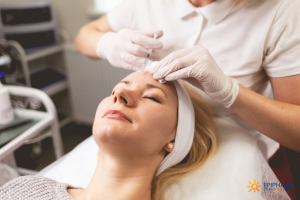 Phototherapy or light therapy uses specific wavelengths of light in the ultraviolent (UV) range to treat certain skin disorders. Ultraviolent light has anti-inflammatory properties in the skin and can be used to decrease skin inflammation and decrease skin itching. It can be used to treat many inflammatory disorders including dermatitis or eczema and psoriasis. It can also be used to treat autoimmune disorders such as vitiligo and even skin lymphomas i...
Phototherapy or light therapy uses specific wavelengths of light in the ultraviolent (UV) range to treat certain skin disorders. Ultraviolent light has anti-inflammatory properties in the skin and can be used to decrease skin inflammation and decrease skin itching. It can be used to treat many inflammatory disorders including dermatitis or eczema and psoriasis. It can also be used to treat autoimmune disorders such as vitiligo and even skin lymphomas i... Read more about Phototherapy (UVA and UVB)









